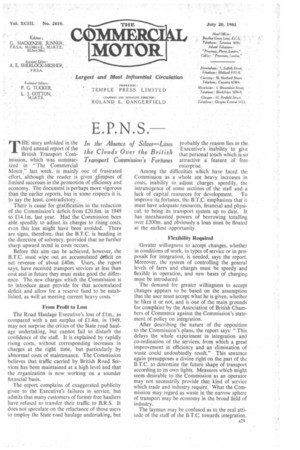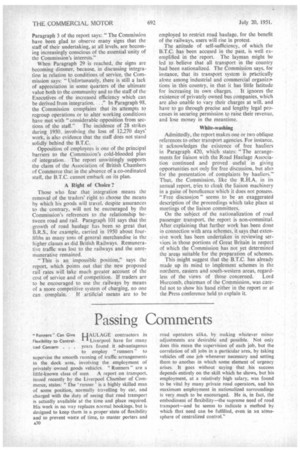E.P.N.S.
Page 31

Page 32

If you've noticed an error in this article please click here to report it so we can fix it.
HE story unfolded in the In the Absence of Silver—Lines third annual report of the British Transport Cointhe Clouds Over the British mission, which was summarTransport Commission's Fortunes ized in "The Commercial Motor: last week, is mainly one of frustrated effort, although the reader is given glimpses of limited successes in the promotion of efficiency and economy. The document is perhaps more vigorous than the earlier reports, but in some respects it is, to say the least, contradictory..
There is cause for gratification in the reduction of the Commission's deficit from £20.8m. in 1949 to £14.1m. last year. Had the Commission been able speedily to adjust its charges to rising costs, even this loss might have been avoided. There are signs, therefore, that the B.T.C. is heading in the direction of solvency, provided that no further sharp upward trend in costs occurs.
Before this aim can be achieved, however, the B.T.C. must wipe out an accumulated deficit on net revenue of about £40m. Users, the report says, have received transport services at less than cost and in future they must make good the difference. The new charges which the Commission is to introduce must provide for that accumulated deficit and allow for a reserve fund to be established, as well as meeting current heavy costs. '
From Profit to Loss The Road Haulage Executive's loss of Elm., as compared with a net surplus of £1.4m. in 1949, may not surprise the critics of the State road haulage undertaking, but cannot fail to disturb the confidence of the staff. It is explained by rapidly rising costs, without corresponding increases in charges at the right time, but particularly by abnormal costs of maintenance. The Commission believes that traffic carried by British Road Services has been maintained at a high level and that the organization is now working on a sounder financial basis.
The report complains of exaggerated publicity given to the Executive's failures in service, but admits that many customers of former free hauliers have refused to transfer their traffic to B.R.S. It does not speculate on the reluctance of those users to employ the State road haulage undertaking, but probably the reason lies in the Executive's inability to give that personal touch which is so attractive a feature of free enterprise.
Among the difficulties which have faced the Commission as a whole are heavy increases in costs, inability to adjust charges speedily, the intransigence of some sections of the staff and a lack of capital resources for development. To improve its fortunes, the B.T.C. emphasizes that it must have adequate resources, financial and physical, to bring its transport system up to date. It has unexhausted powers of borrowing totalling over £200m. and obviously a loan must be floated at the earliest opportunity.
Flexibility Required Greater willingness to accept changes, whether in conditions of work, in types of service or in proposals for integration, is needed, says the report. Moreover, the system of controlling the general levels of fares and charges must be speedy and flexible in operation, and new bases of charging must be introduced.
The demand for greater willingness to accept changes appears to be based on the assumption that the user must accept what he is given, whether he likes it or not, and is one of the main grounds for complaint by the Association of British Chambers of Commerce against the Commission's statement of policy on integration.
After describing the nature of the opposition to the Commission's plans, the report says: "This delays the whole experiment in integration and co-ordination of the services, from which a great improvement in efficiency and an elimination of waste could undoubtedly result." This sentence again, presupposes a divine right on the part of the B.T.C. to determine the future shape of transport according to its own lights. Measures which might seem desirable to the Commission as an operator may not necessarily provide that kind of service which trade and industry require. What the Commission may regard as waste in the narrow sphere of transport may be economy in the broad field of industry. The layman may be confused as to the real attitude of the staff of the B.T.C. towards integration. A29 Paragraph 3 of the report says: "The Commission have been glad to observe many signs that the staff of their undertaking, at all levels, are becoming increasingly conscious of the essential unity of the Commission's interests."
When Paragraph 29 is reached, the signs are becoming dimmer, because, in discussing integration in relation to conditions of service, the Commission says: "Unfortunately, there is still a lack of appreciation in some quarters of the ultimate value both to the community and to the staff of the Executives of the increased efficiency which can be derived from integration. .." In Paragraph 98, the Commission complains that its attempts to regroup operations or to alter working conditions have met with "considerable opposition from sec tions of the staff." The incidence of 28 strikes during 1950. involving the loss of 12,270 days' work, is also evidence that the staff does not stand solidly behind the B.T.C.
Opposition of employees is one of the principal barriers to the Commission's cold-blooded plan of integration. The report unwittingly supports the claim of the Association of British Chambers of Commerce that in the absence of a co-ordinated staff, the B.T.C. cannot embark on its plan.
A Right of Choice.!
Those who fear that integration means the removal of the traders' right to choose the means by which his goods will travel, despite assurances to the contrary, will not be encouraged by the Commission's references to the relationship between road and rail. Paragraph 101 says that the growth of road haulage has been so great that for example, carried in 1950 about fourfifths as many tons of general merchandise in the higher classes as did British Railways. Remunerative traffic was lost to the railways and the unremunerative remained.
"This is an impossible position," says the report, which points out that the new proposed rail rates will take much greater account of the cost of service and of competition. If traders are to be encouraged to use the railways by means of a more competitive system of charging. no one can complain. If artificial means are to be employed to restrict road haulage, for the benefit of the railways, users will rise in protest.
The attitude of self-sufficiency, of which the B.T.C. has been accused in the past, is well exemplified in the report. The layman might be led to believe that all transport in the country had been nationalized. The Commission says. for instance, that its transport system is practically alone among industrial and commercial organizoltions in this country. in that it has little latitude for increasing its own charges. It ignores the existence of privately owned bus companies, which are also unable to vary their charges at will, and have to go through precise and lengthy legal processes in securing permission to raise their revenue, and lose money in the meantime.
White-washing Admittedly, the report makes one or two oblique references to other transport agencies. For instance, it acknowledges the existence of free hauliers in Paragraph 420, which states: "The arrangements for liaison with the Road Haulage Association continued and proved useful in giving opportunities not only for free discussion, but also for the presentation of complaints by hauliers:* Thus, the Commission, like the R.H.A. in its annual report, tries to cloak the liaison machinery in a guise of beneficence which it does not possess. "Free discussion" seems to be an exaggerated description of the proceedings which take place at meetings of the liaison committees.
On the subject of the nationalization of road passenger transport, the report is non-committal. After explaining that further work has been done in connection with area schemes, it says that extensive work has been undertaken in reviewing services in those portions of Great Britain in respect of which the Commission has not yet determined the areas suitable for the preparation of schemes.
This might suggest that the B.T.C. has already made up its mind to implement schemes in the northern, eastern and south-western areas, regard less of the views of those concerned. Lord Hurcomb, chairman of the Commission, was careful not to show his hand either in the report or at the.Press conference held to explain it.




















































































